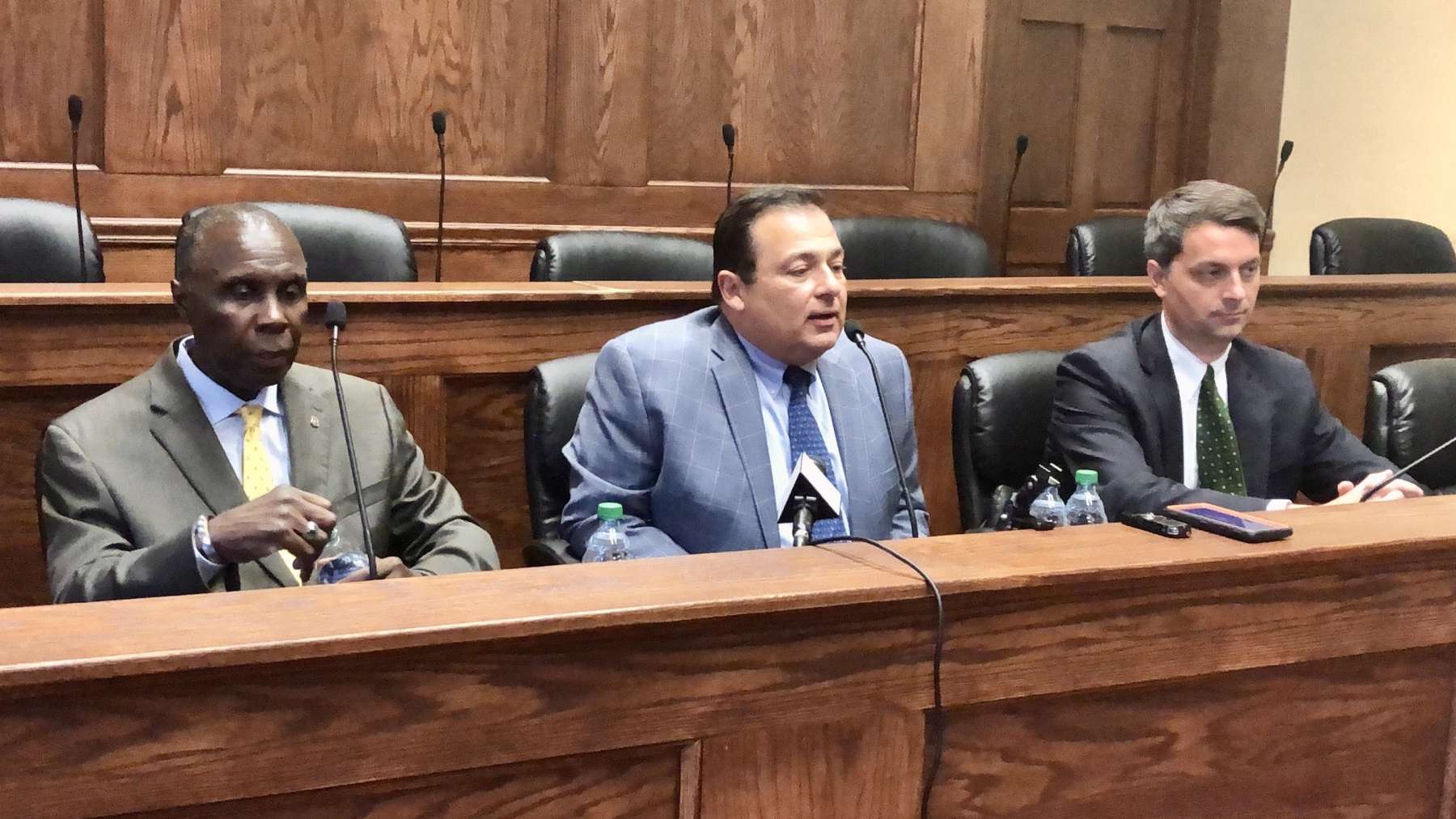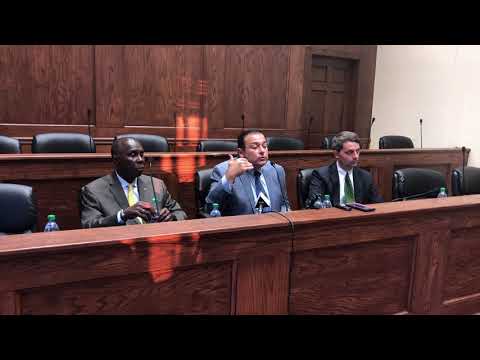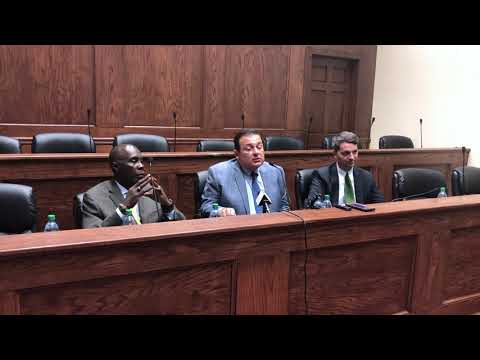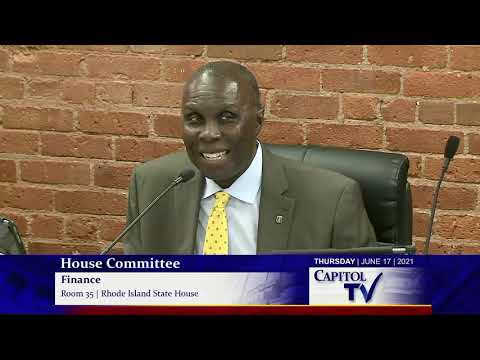Speaker Shekarchi on the 2022 budget: Tax cuts, affordable housing and more
Speaker Shekarchi said he is careful about the tax structure because “I don’t want to drive businesses out of Rhode Island.” He then told an anecdotal story. “I talked to a business in northern Rhode Island, and they were very very concerned with the so-called Tax the Rich. It was a big, large insurance company and he’s like, two-three miles from the Massachusetts border. He made it very clear to me…” The Speaker did not complete the thought, but the indication is that the business owner threatened to leave the state if he is subjected to higher taxes on earnings over $475k.
June 18, 2021, 7:58 am
By Steve Ahlquist
On Thursday Rhode Island’s Speaker of the House Joseph Shekarchi (Democrat, District 23, Warwick), Majority Leader Christopher Blazejewski (Democrat, District 2, Providence) and House Finance Chair Marvin Abney (Democrat, District 73, Newport) took questions about the just finalized 2022 State Budget, which was just hours away from being passed out of committee. The full House will vote on the budget next Thursday, beginning at 2pm. The total proposed budget is about $13.1b.
You can watch the budget conference in the video here:
Taxes
Tax the Rich (3m35s) – Speaker Shekarchi said that he had a few reasons to not include the “so-called Tax the Rich” plan put forward by progressives that would raise the taxes on those in Rhode Island making over $475k a year.
- There was not overwhelming support in the House. [Which may mean that progressives have their work cut out for them in replacing more members of the House].
- Shekarchi has a “cautious, wait and see attitude” as the Federal proposals to increase taxes on the richest one percent of Americans. A broad based Federal tax would be preferred, said the Speaker, since he’s “cognizant of the fact that [Rhode Island] has to be competitive with our neighbors. Shekarchi said that if we raise taxes, people and businesses will leave Rhode Island for neighboring states, an idea with no actual data to support it.
- Shekarchi also suggested that small family businesses would be subject to this tax. This is also not supported by evidence. Less than one percent of pass-through businesses in Rhode Island declare profits of over $475k, and those that do are mostly elite law firms.
Speaker Shekarchi said he is careful about the tax structure because “I don’t want to drive businesses out of Rhode Island.” He then told an anecdotal story. “I talked to a business in northern Rhode Island, and they were very very concerned with the so-called Tax the Rich. It was a big, large insurance company and he’s like, two-three miles from the Massachusetts border. He made it very clear to me…” The Speaker did not complete the thought, but the indication is that the business owner threatened to leave the state if he is subjected to higher taxes on earnings over $475k. (27m45s)
PPP Loans (2m46s) – The exemption on the PPP taxes has been raised from $100k to $250k. PPP loans were given to businesses from the Federal government to tide them over during the pandemic. The Federal government turned the initial PPP loans into grants, and then exempted the loans from taxation. On the State level, once the loans became grants they became taxable income. By exempting the loans from taxation, Rhode Island is granting a very broad one time tax break on Rhode Island business owners who took out less than $250k in loans. Note that taxing this money would not have benefitted companies that struggled during the pandemic. This was a tax on a company that managed to make a profit during the pandemic.
Had the state taxed the PPP loans, it would have generated an estimated $133m in revenue. At the $100k threshold the state would have generated $67m, at the $250k threshold it’s around $40m.(29m20s)
There will be no tax on sugary drinks. There just wasn’t interest from the Democratic caucus in pursuing this, said Speaker Shekarchi. (6m40s)
The car tax phaseout will continue. “That’s extremely popular,” says Shekarchi. The car tax phaseout is hitting more and more expensive automobiles as it continues, meaning that as of now, phasing out the car tax out begins to favor owners of expensive automobiles and owners of multiple expensive automobiles more, essentially a tax cut for the rich. (12m40s)
Affordable Housing
There is funding throughout the budget for affordable hosing, including a “Pay for Success” pilot program. (7m30s) Speaker Shekarchi says affordable housing is his number one priority this year.
There are a few ways in which the budget attempts to tackle the problem of affordable housing. All of them are multi-year plans.
- A dedicated revenue stream for housing production – for affordable housing has been established with a conveyance tax on properties worth over $800k.
- Housing Czar – a new salaried position to oversee the development of housing in the state.
- Pay for Success (31m35s) – The program recognizes that “people who are chronically homeless use a lot of state resources,” said Representative Blazejewski. “So we put money in a program to try to come up with a way to provide wrap-around services and housing services to a 125 chronically homeless in Rhode Island to save state revenue for Human Resources, provides homes, keep them out of our criminal justice system, to save money.”
- A land use review committee and a low- to moderate-income commission have been started to look at these issues in depth.
The Pay for Success program has been championed by Representative Liana Cassar (Democrat, District 66, Barrington, East Providence) for many years. The pilot program will cost $6m over the course of five years. The 125 people the pilot program may assist reflects maybe 10 percent of the problem in Rhode Island as it exists today. Pay for Success was initially proposed as a social impact bond program. See here and here.
It is “way too early” to know how many units of affordable housing would come online, or when, said Speaker Shekarchi. The idea is to develop long term revenue streams towards affordable housing.
In this video the Speaker explains some of his ideas around affordable housing:
Other social programs:
RI Works (14m35s) – A program that provides clothing assistance to low-income Rhode Islanders has received its first increase in 30 years. The increase is about 30 percent.
Temporary Assistance for Needy Families (TANF) (42m05s) – has also seen an increase.
DCYF (Department of Children, Youth, and Families) (21m15s) – DCYF got all the money the Governor requested, and an additional $10m+. This includes a $200k salary for a new director and upgrades to computer systems. Oversight hearings will continue. DCYF “has been a legacy problem” and the House will continue to invest in DCYF.
Charter Schools
Charter Schools (11m04s) – There is no charter school moratorium in the budget. That still exists as a standalone bill which may or may not change and may or may not pass. Governor Daniel McKee has vowed to veto the charter moratorium were it to pass.
Changes to charter schools include an opt out rather than an opt in lottery system to earn a place in the school, which may have the effect of making student selection more fair.
Policing
Policing (17m55s) – Funding for a new State Police Barracks is in the budget. In addition to the spending on a statewide body-worn police camera system. Rhode Island is committing to an increase in funding for police after a summer of advocates calling for diverting resources away from police and into new forms of public safety.
Infrastructure
State Health Lab (17m55s) – Funding for a new state health Lab is not in the budget. A plan needs to be finalized and presented by the Department of Health, and Speaker Shekarchi expects to use Federal dollars to build the lab.
Eleanor Slater Hospital (1m15s) – No formal plan has been put forward by the Governor, so though the issue “is near and dear to our hearts” the process of evaluating the estimated $64.9m plan has yet to begin. Maybe in a proposed September session, maybe next session. The House did allocate money to plug Zambarano’s deficit.
Cannabis
Cannabis legalization (25m25s) – Not in the budget. Perhaps in the proposed September session, or next session. This deal may be a blessing to social justice advocates, who are pushing to center social and economic justice in whatever legalization scheme Rhode Island comes up with.
Film Credits
Film credits (26m30s) – An additional one-time $10m film credit is being added to the annual $20m credit. The Speaker suggested that Disney and/or Netflix are rumored to be interested in filming in the state.
Here’s the House Committee on Finance passing the budget:









